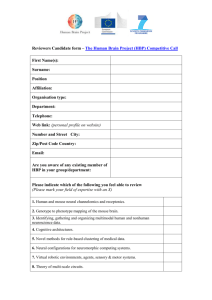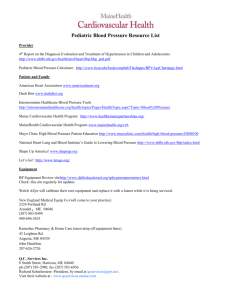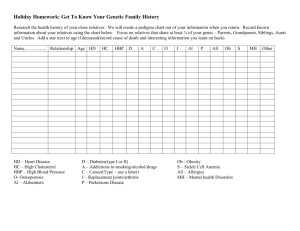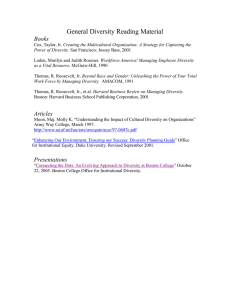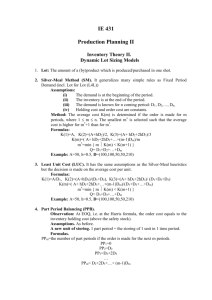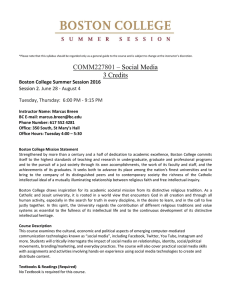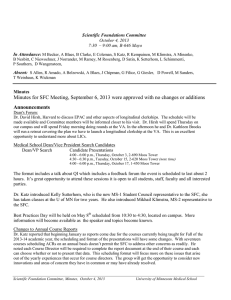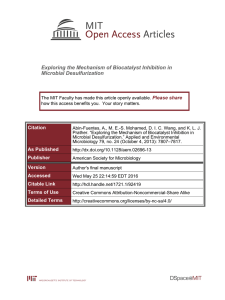Document 11133579
advertisement
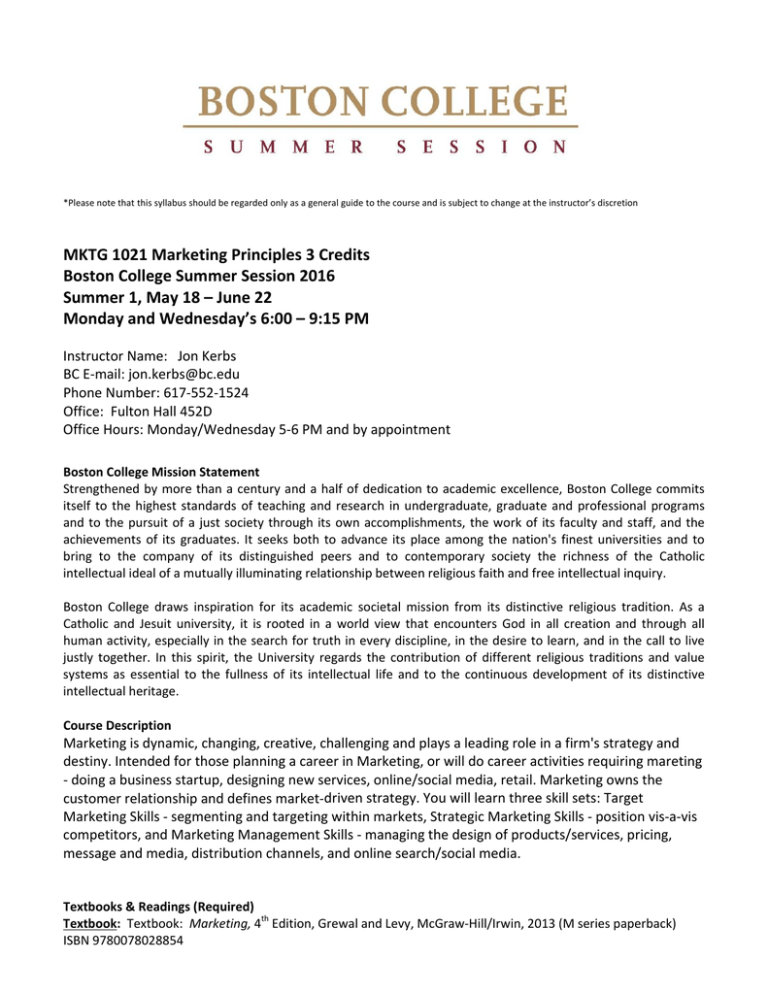
*Please note that this syllabus should be regarded only as a general guide to the course and is subject to change at the instructor’s discretion MKTG 1021 Marketing Principles 3 Credits Boston College Summer Session 2016 Summer 1, May 18 – June 22 Monday and Wednesday’s 6:00 – 9:15 PM Instructor Name: Jon Kerbs BC E‐mail: jon.kerbs@bc.edu Phone Number: 617‐552‐1524 Office: Fulton Hall 452D Office Hours: Monday/Wednesday 5‐6 PM and by appointment Boston College Mission Statement Strengthened by more than a century and a half of dedication to academic excellence, Boston College commits itself to the highest standards of teaching and research in undergraduate, graduate and professional programs and to the pursuit of a just society through its own accomplishments, the work of its faculty and staff, and the achievements of its graduates. It seeks both to advance its place among the nation's finest universities and to bring to the company of its distinguished peers and to contemporary society the richness of the Catholic intellectual ideal of a mutually illuminating relationship between religious faith and free intellectual inquiry. Boston College draws inspiration for its academic societal mission from its distinctive religious tradition. As a Catholic and Jesuit university, it is rooted in a world view that encounters God in all creation and through all human activity, especially in the search for truth in every discipline, in the desire to learn, and in the call to live justly together. In this spirit, the University regards the contribution of different religious traditions and value systems as essential to the fullness of its intellectual life and to the continuous development of its distinctive intellectual heritage. Course Description Marketing is dynamic, changing, creative, challenging and plays a leading role in a firm's strategy and destiny. Intended for those planning a career in Marketing, or will do career activities requiring mareting ‐ doing a business startup, designing new services, online/social media, retail. Marketing owns the customer relationship and defines market‐driven strategy. You will learn three skill sets: Target Marketing Skills ‐ segmenting and targeting within markets, Strategic Marketing Skills ‐ position vis‐a‐vis competitors, and Marketing Management Skills ‐ managing the design of products/services, pricing, message and media, distribution channels, and online search/social media. Textbooks & Readings (Required) Textbook: Textbook: Marketing, 4th Edition, Grewal and Levy, McGraw‐Hill/Irwin, 2013 (M series paperback) ISBN 9780078028854 You do not need to purchase related items such as the ‘Connect Plus’ package. This book is available from the BC bookstore or online booksellers such as Amazon. Electronic versions are available from Amazon, Coursesmart, and Inkling. It is also on reserve at O’Neill Library. Other editions of this textbook (both earlier and later) are widely available. Be aware that the content will be similar, but not always identical. Use these at your own risk. Course Pack: Harvard Business Publishing Course link for MKTG 1021 Cases and Readings from Harvard Business Publishing: TBD You need to register on the site to create a user name if you do not already have one. Once you have registered, you can log in to see the course materials. You will pay one time to access all the course materials. Some of these materials are in PDF documents, and you can open them with Adobe Reader. Others are Excel spreadsheets; some are audio only and one case is in a multi‐media format. You will have access to these materials for 6 months. After you register, you can get to the course again by doing the following: 1. Visit hbsp.harvard.edu and log in. 2. Click My Courses, and then click this course name: Marketing Principles. For technical assistance, please contact the Harvard Business Publishing Tech Help line at (800) 810‐8858 (outside the U.S. and Canada, call 617‐783‐7700); or email techhelp@hbsp.harvard.edu. Our business hours are 8am‐8pm ET, Monday‐Thursday, and 8am‐7pm ET on Friday. Canvas Canvas is the Learning Management System (LMS) at Boston College, designed to help faculty and students share ideas, collaborate on assignments, discuss course readings and materials, submit assignments, and much more ‐ all online. As a Boston College student, you should familiarize yourself with this important tool. For more information and training resources for using Canvas, click here. Course Objectives The course objectives are to: develop a working knowledge of six critical Marketing competencies and each of their associated Marketing principles; these competencies are: understanding Value Creation, defining Marketing Objectives, leveraging Marketing Metrics, implementing Marketing Analysis, developing Marketing Strategy components, and executing Marketing Tactics leveraging these competencies and marketing skills, internalize a marketing decision‐making mindset use an organized Marketing Planning approach to organize and recommend key Marketing initiatives reinforce interacting in Team situations through the Group Project and some case study work develop knowledge across cultural settings and learn the impact of culture, gender, and age in marketing (segmentation and targeting) demonstrate ethical skill in marketing decision making int eh areas of pricing and consumer research] Grading Course Deliverables: Final Exam Class Participation Quizzes 35% 25% 40% Semester comprehensive Receive points in each class 4 @ 10% each Each assignment will receive a numerical grade during the semester. At the end of the semester, a numerical average will be calculated using the weighted proportions indicated above. This average will then be converted to a letter grade for the overall final course grade using the standard BC system below. Please note: “rounding up” will not occur in the final grade calculation. 100‐94 = A 93.9‐90 = A‐ 89.9‐87 = B+ 86.9‐84 = B 83.9‐80 = B‐ 79.9‐77 = C+ 76.9‐74 = C 73.9‐70 = C‐ 69.9‐67 = D+ 66.9‐64 = D 63.9‐60 = D‐ below 60 = Failing The undergraduate grading system for Summer Session is as follows: A (4.00), A‐ (3.67) B+ (3.33), B (3.00), B‐ (2.67) C+ (2.33), C (2.00), C‐ (l.67) D+ (l.33), D (l.00), D‐ (.67) F (.00) All students can access final grades through Agora after the grading deadline each semester. Transcripts are available through the Office of Student Services. Course Assignments It is expected that you will spend 8 hours per week on out‐of‐class assignments and exercises. These are listed below. Please note that some weeks will require more time and some weeks less time but the average is approximately 8 hours per week over the semester. Course Schedule Class 1 2 3 Date 5/18 Topic Course Introduction Assignment Review: Syllabus with Course Schedule found on Blackboard Vista Overview of Marketing Read: Chapter 1 (Marketing) 5/20 Value Creation Read: Creating Value: The Core -- Michael Porter (HBP Coursepack) Read: Chapter 2 (Marketing) 5/23 Marketing Strategies & Plans Consumer Behavior Read: Chapter 6 (Marketing) Case: Struggling to Make the Best Buy (HBP) 4 5/25 Marketing Research Read: Chapter 10 (Marketing) Case: TruEarth Case + Spreadsheet (HBP) Notes Quiz #1: Ch. 1 Ch. 2 Porter article 5 6/1 Segmentation, Targeting and Positioning 6 6/6 Products and Branding 7 6/8 Developing New Products Read: Chapter 9 (Marketing) Read: Positioning: The Essence of Marketing Strategy (HBP) Case: The Fashion Channel + Spreadsheet (HBP) Read: Chapter 11 (Marketing) Read: Understanding Brands (HBP) In Class: Analyze BC Brand Read: Chapter 12 (Marketing) Case: Clean Edge Razor + Spreadsheet (HBP) 8 6/13 Integrated Marketing Communications 9 6/15 Pricing Concepts for Establishing Value 6/20 11 6/22 Supply Chain and Channel Management; Retailing Quiz #3: Ch. 9 Ch. 11 -Brand article -Positioning article Read: Chapter 3, 17 and 18 (Marketing) Case: MINI (HBP) Read: Chapter 14 (Marketing) Case: Heinz (HBP) + Heinz Worksheet (Canvas) + Marketing Metrics (Canvas) 10 Quiz #2: Ch. 6 Ch. 10 Quiz #4: Ch. 3 Ch. 12 Ch. 17 Ch. 18 Read: Chapter 15 and 16 (Marketing) Read: Natureview Farm (HBP) + Spreadsheet (Canvas) Final Exam Attendance Attending class is an important component of learning. Students are expected to attend all class sessions. When circumstances prevent a student from attending class, the student is responsible for contacting the instructor before the class meets. Students who miss class are still expected to complete all assignments and meet all deadlines. Many instructors grade for participation; if you miss class, you cannot make up participation points associated with that class. Makeup work may be assigned at the discretion of the instructor. If circumstances necessitate excessive absence from class, the student should consider withdrawing from the class. Consistent with BC’s commitment to creating a learning environment that is respectful of persons of differing backgrounds, we believe that every reasonable effort should be made to allow members of the university community to observe their religious holidays without jeopardizing their academic status. Students are responsible for reviewing course syllabi as soon as possible, and for communicating with the instructor promptly regarding any possible conflicts with observed religious holidays. Students are responsible for completing all class requirements for days missed due to conflicts with religious holidays. Accommodation and Accessibility Boston College is committed to providing accommodations to students, faculty, staff and visitors with disabilities. Specific documentation from the appropriate office is required for students seeking accommodation in Summer Session courses. Advanced notice and formal registration with the appropriate office is required to facilitate this process. There are two separate offices at BC that coordinate services for students with disabilities: ● ● The Connors Family Learning Center (CFLC) coordinates services for students with LD and ADHD. The Disabilities Services Office (DSO) coordinates services for all other disabilities. Find out more about BC’s commitment to accessibility at www.bc.edu/sites/accessibility. Scholarship and Academic Integrity Students in Summer Session courses must produce original work and cite references appropriately. Failure to cite references is plagiarism. Academic dishonesty includes, but is not necessarily limited to, plagiarism, fabrication, facilitating academic dishonesty, cheating on exams or assignments, or submitting the same material or substantially similar material to meet the requirements of more than one course without seeking permission of all instructors concerned. Scholastic misconduct may also involve, but is not necessarily limited to, acts that violate the rights of other students, such as depriving another student of course materials or interfering with another student’s work. Please see the Boston College policy on academic integrity for more information.
